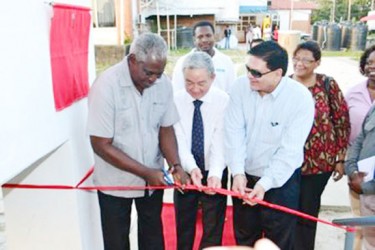Under withering criticism and questioning over how China Central TV (CCTV) has been broadcasting here, Prime Minister Sam Hinds yesterday said that it had no licence to transmit but that its signal is simply being relayed by the state-owned NCN.
The Prime Minister, in a statement yesterday said categorically that government had not issued a licence to CCTV in violation of the laws governing frequency allocation and broadcasting.
“CCTV has no licence to broadcast in Guyana. The licensed broadcaster, National Communications Network (NCN) Inc, is relaying CCTV programmes for 18 hours or more, on one of its assigned channels… CCTV is not broadcasting in Guyana – it is not licensed and needs no licence. NCN is relaying a feed from CCTV, as other TV stations relay satellite-feeds of their choice, including CNNI, BBC, NBC, CBS, and CCTV,” Hinds said in the statement, which came after weeks of complaints that CCTV had been granted a licence to broadcast and assigned a frequency even though there had been applications by locals for same.

On February 9, the transmission facility was commissioned in the compound of NCN without clarification of the basis of the arrangement. And despite weeks of reporting that a licence had been granted and a frequency assigned, the government made no refutation of this until Hinds’ statement. At a news conference last week, Head of Presidential Secre-tariat Dr Roger Luncheon did not deny that CCTV had been granted a broadcasting licence. He had also said that CCTV licence application had predated the embargo on the granting of new licences.
The Prime Minister noted that in 2004 Guyana and China struck an agreement for CCTV to provide transmitting facilities to NCN, which would then become the property of NCN. This equipment would then be used to “re-broadcast specific programmes” of CCTV on one of the channels assigned to NCN. “This is a business arrangement of NCN, not unlike the arrangement under which TBN was relayed in Guyana. At that time, Channel 29/Cable 80 was earmarked to NCN for part-use in re-broadcasting CCTV programmes, but when the Learning Channel came along in early 2011, NCN began utilizing that previously earmarked Channel for the Learning Channel. Consequently, in 2012, when the re-broadcasts were to begin, Channel 27/Cable 78 was instead assigned as a substitute,” he added.
Hinds also said CCTV programmes are no more foreign propaganda than any other foreign-originated program-mes relayed in Guyana.
‘Ludicrous’
Hinds’ statement, however, failed to allay criticism over the allocation process for two frequencies for the relay of CCTV, notably from broadcast expert Kit Nascimento and veteran broadcaster Enrico Woolford. The Georgetown Chamber of Commerce also expressed concern over matter on Saturday and called for an explanation.
Hinds’ explanation—that the frequencies were assigned to NCN to relay CCTV programming—yesterday raised more questions about the process. Nascimento, when contacted by this newspaper, maintained that new rules have been set by government’s backdoor approach that ignores the laws and regulations while Woolford similarly said Guyanese and Caribbean broadcasters were being shut out by government’s preferential farming out of frequencies.
“The precedent remains. For the Prime Minister to draw a parallel between the Chinese government programming and privately-owned commercial programming received and broadcast in Guyana from the satellite is ludicrous,” Nascimento told Stabroek News.
Nascimento maintained that that the government committed violations by virtue of its actions. “My concerns arise from the long and well-established international principles which guide and govern broadcasting law. In my view, these principles have been violated and in spite of the PM’s assurance which are in direct conflict and direct contradiction of the statements made by Dr Luncheon and GTV CEO Michael Gordon,” he said.
“The government’s sleight-of-hand does not alter the fact that the government of China has been given a frequency a dedicated frequency to broadcast in Guyana. It continues to establish a precedent because even though the Prime Minister is now saying that the CCTV has not been licensed to broadcast, the National Broadcasting Agency has assigned them a frequency. On what basis therefore would the National Broadcasting Authority deny a request from a frequency from, say, Voice of America or for any other state-owned agency?” he added.
Nascimento also felt that the comparison between CCTV and TBN being broadcast here was disingenuous. “One is a government-owned channel broadcasting government material and the others are commercially-owned channels completely free from any government or inference,” he noted.
Meanwhile, Woolford questioned whether Hinds was saying that the National Frequency Management Unit (NFMU) had given NCN a channel last year to facilitate CCTV. “If the government bypassed the NFMU and latterly the Guyana National Broadcast Authority then what the Prime Minister is in fact saying is that [NCN] arrogated to itself three frequencies and what allocations have been made by the [NFMU]. This brings us back to my original question about the available frequencies and what allocations have been made by the [NFMU],” he wrote in a letter in response to Hinds’ statement.
He further questioned how Guyanese and other Caricom nationals could invest in the limited electromagnetic spectrum if they do not know what is available and if the administration can allocate frequencies to itself and others. “Is another dangerous precedent being set? Is the government squeezing out ‘freedom of expression’ by allocation?” he asked.
Woolford, meanwhile, also wants to know the difference between the China-Guyana agreement and the domestic agreement on the channel in Linden. He questioned, “Could the national broadcaster allow the regional broadcaster to regain the frequency in Linden to relay what the people in the region want?”






